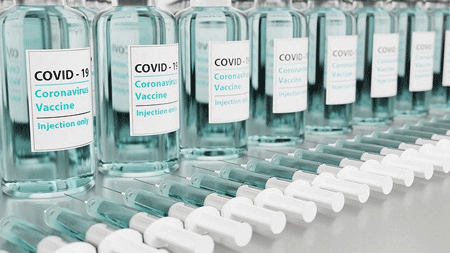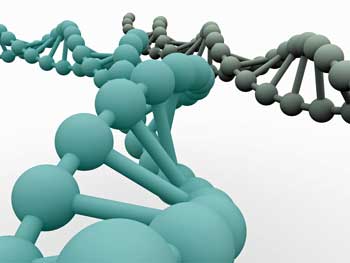



Patrick McGowan’s epigenetic research started out as a small 24 person pilot project funded by the SolveCFS Initiative but it’s not small any more. With the help of a $500,000 grant from the Dr. Ralph and Marian Falk Medical Research Trust, Patrick McGowan (and Dr. Lucinda Bateman) are now embarking on a 300 person study.
Epigenetics studies changes how our genes express themselves over time in. Think of your genetic makeup as a blank slate when you were born. Look forward twenty or thirty years, though, and you’ll see portions of that slate have been over-written: some genes that weren’t turned on back then are now turned on. Others that were going full bore have been silenced. That’s epigenetics – a field some researchers believe may, in the end, be ultimately more important with regard to chronic diseases than our original genetic makeup.
Consider the possibility that key genes that were serving to keep you strong and healthy got turned off or possibly genes that were guaranteed to make you sick got turned on just before you became ill. Maybe it wasn’t that bug, that flu or whatever you thought it was that got you ill. Maybe the problem was that your gene expression changed. If that’s true then good luck trying to fix the problem without getting at those epigenetic changes. Everything you do will be like a bandaid put over a genetic sore.
McGowan’s SolveCFS Initiative pilot study found epigenetic changes in 800 genes involved in metabolic regulation (energy production), kinase activities (metabolic and much more), the immune response and more in people with ME/CFS. His finding appeared to be on track with what we know: they suggested ME/CFS patients immune systems were skewed to a Th2 immune response and they highlighted inflammatory processes. One particularly interesting epigenetically altered gene was associated with EBV infection of B-cells. Another effected a major inflammatory transcription factor called NF-kB which turns on genes involved in inflammation.
The Dr. Ralph and Marian Falk Medical Research Trust obviously felt McGowan was on to something because they awarded him one of ten or so grants they are giving out in their new translational research effort that opened in October. This effort emphasized these factors:
- Understanding underlying disease processes and how they disrupt normal human biology,
- Identification of biological markers of disease activity and progression
- Development and testing of diagnostic or prognostic tests based on those markers
McGowan’s research could affect all three: understanding ME/CFS, finding biomarkers and developing diagnostic tests.
This grant shows once again that pilot studies work, and that more and more funders are considering ME/CFS a subject they want to invest in. The Dr. Ralph and Marian Falk Medical Research Trust is not a flash in the pan; it’s an established non-profit that’s given out almost $200 million in grants over the past thirty years. It’s good news when a long-established funder believes chronic fatigue syndrome is a good investment. The competition in this era of reduced NIH budgets was probably fierce. Kudo’s to whoever took advantage of this funding opportunity.









Great stuff, this is just the kind of thing we need, and lots of it: replication of promising early findings.
Thank you, Dr. Ralph and Marian Falk for making this research possible.
Yes, indeed – thanks for supporting ME/CFS research. I hope many more research foundations will recognize the worth of supporting this kind of research in the future.
Yet more excellent research; my profound thanks to all those involved. Do others, like me, detect the beginnings of a ‘snowball effect’ in respect of research into ME [CFS], namely more and more scientists being drawn towards such research until the momentum becomes unstoppable ? If I’m right, expect to see many rats desert the sinking ship of that wing of the psychiatric ‘profession’ that clings on desperately to the mantra that ME [CFS] is “all in the mind”.Think of the lucrative patient base they will lose.
What wonderful news. Thank you to the Falk’s for donating to ME/CFS research. And thank you Cort for posting.
if you need bodies to study…I put my hand up!
(Latent-residing) Viruses, viruses, viruses (which are fundamentally parasites)…
And something that let them loose!
I believe that key genes that were serving to keep me strong and healthy, got so turned “on”, that they caused me to develop an autoimmune illness ME/CFS. I believe that bug, or flu, or whatever (chemical, inoculation, trauma etc) was the trigger that sent my already innately, up-regulated immune system into permanent overdrive.
Wow… this sounds great! 🙂 SOOO happy to see more research being done in this area. I’ve often wondered what happened to my usually ‘strong’ system… I was as healthy and strong as a horse until I turned 38 when all he’ll broke loose! 🙁 Growing up with a house full of siblings when colds or the flu came around I never caught them. When the entire house was scratching away with the Chickenpox and other so-called childhood ailments, I never caught them. I was the epitome of good health with nary a broken bone, sprained ankle, growing pain – nothing! Then… When I turned 38, and after being hospitalized for 2 months due to a terrible 4-wheeler accident where my pelvis was broken in 4 places, everything seemed to go straight downhill! I was first diagnosed with FM, then CFS/ME, Myofacial Pain Syndrome, then arthritis, IBS, IC, and numerous other chronic illnesses. 🙁 So much for that strong, 9-foot-tall-and-bulletproof system I’d joked about all of my life! The last 19 years of my life seems like it’s been playing catch-up with all the ailments I didn’t catch when I was young! I actually had a super-nasty cold/flu last year (s?) which lasted from July 2013 to today!! My body just can’t seem to fight anything anymore!
… waiting patiently for the results of this upcoming study as I’d REALLY love to get even a small portion of my life back! :/
Isn’t that something Jonikas – something in that accident reset your system big-time! Who knows – maybe the expression of your genes shifted?
Good luck with everything!
Jonikas: Did you ever think that strong immune system that you use to brag about when you were younger (I had one just like yours) is now actually way over-performing, not under-performing; sending out far too many disease fighting proteins?
Infection vs Reaction
1) Symptoms of an infection (down system) include fatigue, inflammation, low grade or spiking fever, body aches, cough, sore throat etc.
2) Symptoms of a reaction (up system) include fatigue, inflammation, low grade or spiking fever, body aches, cough, sore throat etc.
You may believe you have a nasty cold, but perhaps your body is over-reacting to something in the environment. I never get the flu, or colds, since, I developed ME/CFS almost 30 years ago, my immune system is “extra” hyper-responsive. I do, however, have reactions. If for example, I am in a place where everyone is sick with the flu (eg hospital emergency) I will start coughing and sputtering just like everyone else. The difference is though, as soon as I leave the place, where germs are overwhelming my immune response, my over-reaction to the germs stops and I don’t become sick. My immune system wins the battle against the virus every time.
Many people are prone to illnesses caused by a less-than-optimal immune system eg (cancer, diabetes, infections, viruses}. I, on-the-other-hand, react to the extreme to everything my body decrees foreign eg (chemicals, viruses, bacterias). My immune system is innately prone to over-react. It is up-regulated eg (allergies, inflammation, IBS, anaphylaxis, autoimmunity). My body keeps sending out disease fighting chemicals, often times, long after the battle is over.
That’s fascinating, Rachel. I’m exactly the same way; nary a sniffle, let alone a flu, in more than a decade, but heaven help me if I encounter a substance my body takes offense to! Yet I’ve all the symptoms of a chronic infection just as you described. My doctor has, more than once, made the comment, “you’re quite sick” and I’ve always responded, “yes, and yet I’m not” – meaning I don’t have something one might detect, treat and recover from. Haven’t had a flu shot in forever because I’m far more concerned about having a reaction to the vaccine than I am about getting the flu. I did have a pneumococcal vaccine, but that was to test my immune system – which, as you stated is your case, is in constant hyperdrive. Inflammation, inflammation, inflammation! The better I have that under control, the better off I am. If only there were some consistent way to keep it at bay. I have tried and contine to try any and everything. Many things work initially, but the effect/improvement is never long lasting; the efficacy declines over time. One medication, however, has kept me from significantly declining: clarithromycin. 500mg 2/day (sometimes 3/day if I’m especially ill.) It has powerful anti-inflammatory properties as well as some lesser understood effects in the brain (re Emory studies). Wondering if anyone else has found clarithromycin beneficial. My internist is tightly wound over my years of continuous use, but every specialist says to continue. Some have a vague idea of how it might be helping me so much while others have their doubts – as if I could duplicate it’s positive effects if I only tried harder. Went off on a tangent there. Really fascinating, Rachel. I’d suspected as much. Comforting to hear someone else confirm the same.
Never heard of that drug before – interesting – thanks for sharing. Some tetracycline antibiotics are believed to have neuroprotective properties. One is being studied as a possible microglial inhibitor.
AnnaL I’m glad my post resonates with you, as I’m sure it does with some other ME/CFS sufferers. Another thing I have observed over the years is that people who fall into the first category (Infection) also are more likely to suffer from depression (down, unmotivated, “weighed down”) and those in the second category (Reaction) are more likely to suffer from high anxiety (up, wired, “can’t relax”). The first group (Infection) are more likely to have their symptoms improve with exercise by making feel-good endorphins; boosted-up. Exercise in the second group (Reaction) is not beneficial and only exacerbates symptoms; running-on-empty, endorphin deficiency; crash and burn.
Interesting – I’m definitely in the second group
Great to see this funding for our tragic illness . Thanks to all involved. Thanks Cort for the articles, at times there is a little glimmer of hope.
Glad to provide. Hopefully at some point I’ll be handing out notices like this weekly 🙂
I believe there is more than a glimmer of hope. I agree that the tsunami I wrote about in my blog is going to get hit with another tsunami: researchers and funding are going to get “hooked” onto ME/CFS, as suggested above, Cort. Your reports are so uplifting to a community who is greatly thirsty for some good news for a change.
They’re uplifting to me too :). I feel the wave is slowly building….and at some point it will wash away all the naysayers!
Where do I sign up!?
From your words to the medical establishments ears!
Guarded optimism. Take a look at epigenetics research in FM, which did come up with a blood biomarker. It met with a great amount of skepticism and even after a follow up study addressing the unanswered questions, proving the FM specifically (no research is ever 100%; if it is, that’s when we question validity), it is still being criticized. More work to be done for sure. Possibly this research will show how looking at disease in this way is a better indicator, especially for orphan disorders such as ME/CFS and FM.
Interesting. These big data project that sift through hundreds or thousands of markers are tough…It’s takes a lot to winnow it down to one or a couple of markers. Guarded optimism is probably good – this technology is probably continuing to be developed.
Thanks for bringing this to us Cort! And many thanks to the Falks!
As one who has been bed-bound for years with ME/CFS but who after many stops and starts seems to be in what I call a remission currently, I congratulate the researchers on opening up the field of epi-genetics in relation to these illnesses. It is field of great research into illness in the future I believe. However as many others I was totally well and active before I got ME/CFS…..It came on 1 week after Influenza A. I also had a major reaction after having influenza vaccine which resulted in hospitalization and hen to a nursing home. I was so desperately ill. So I still wonder if viruses , or parts of them are not epigenetically active.
Even after years I still shake my head at peoples stories! I imagine that viruses are potentially very strong agents of epigenetic change.
Hi Marilyn:
Can you please share what you are doing that has moved you out of bed into functioning again. Any info greatly appreciated.
Thanks, Lisa
lgrasso_hawaii@yahoo.com
I am in the group that never gets a cold or flu – maybe 3 colds and 1 flu in 19 years. But I started low dose naltrexone about 5 months ago. Last week I got a very normal cold – amazing. I am currently reading “Plague” by Heckenlively and Mikovitz. It still makes sense to me that some sort of retrovirus is the culprit. Who is funding for that????
Hi Paula,
Your post is very timely, because it answers a question I’ve had during the past few weeks. Since the severe upper respiratory infection that triggered my ME in 1988, I’ve had three colds (milder than previously), and no flu. That is, until three weeks ago when I caught a “bug” with exactly the same symptoms I experienced in 1988. I’m still struggling to recover.
I started low-dose naltrexone two months ago, at an even lower-than-usual dose — 1/2 mg for the first month, 1 mg for the second. Since I can usually be in a room full of sick people and not “catch” what they have, I’ve been wondering if the LDN is changing my immunity. I’ve read two conflicting opinions/experiences with LDN and immunity — that people taking it have fewer colds (increased immune system strength), and that it weakens the immune system.
Only time will tell which category I end up in. If, as my dosage is increased, my ME/FM symptoms lessen, I’ll gladly accept more frequent colds. But, if I end up with more frequent colds/flu on top of the already life-limiting effects of ME/FM, that’ll be a deal breaker for me with respect to taking LDN long-term.
I too almost also never get normal sicknesses like colds or flu…including when I did the LDN protocol. My obvious compromising event was the hormonally based chemical poisoining at age 42, after which everything changed. But the question now is maybe that change was actually more involved on gene swtiching than the poisoning itself.
I am extremely happy to hear about this McGowan study and thanks for posting about it! For the past 18 months or so, I’ve been doing ongoing genetic consults to help interpret my genetic testing. And as a result, I now have a huge interest in epigenetics. My genetic testing has shed light on things that I have struggled with, some all my life, but never quite knew why.
Cort, thanks again for a great write up. In fact, Dr Vernon wrote the proposal to the Falk Medical Trust and the award was given to the Solve ME/CFS Initiative. (http://solvecfs.org/500000-grant-awarded-to-the-solve-mecfs-initiative-to-further-epigenetic-research/) SMCI will contract with Dr’s McGowan and Bateman to collaboratively expand this study and SMCI/Dr. Vernon will manage the program. It is a very exciting, worthwhile and important study and SMCI is thrilled to have received the award to further explore this important area.
Leigh